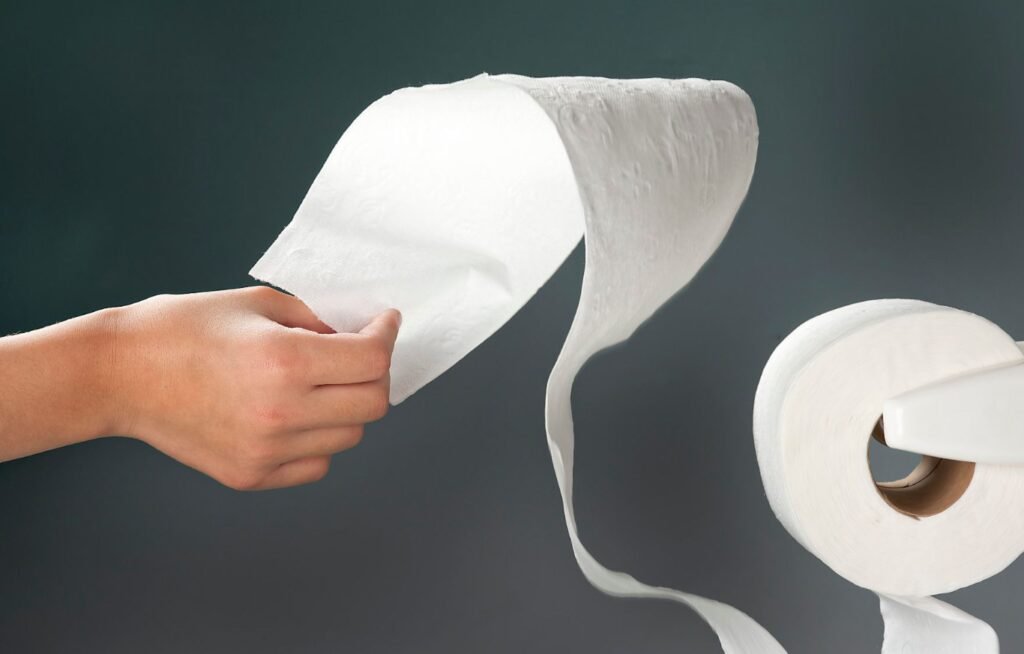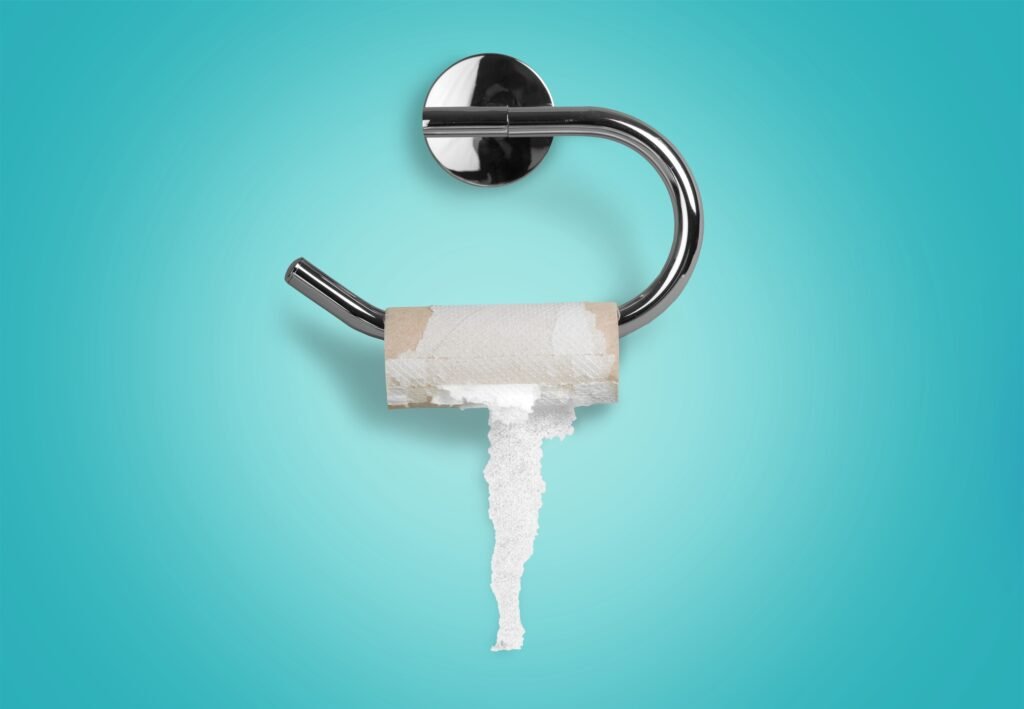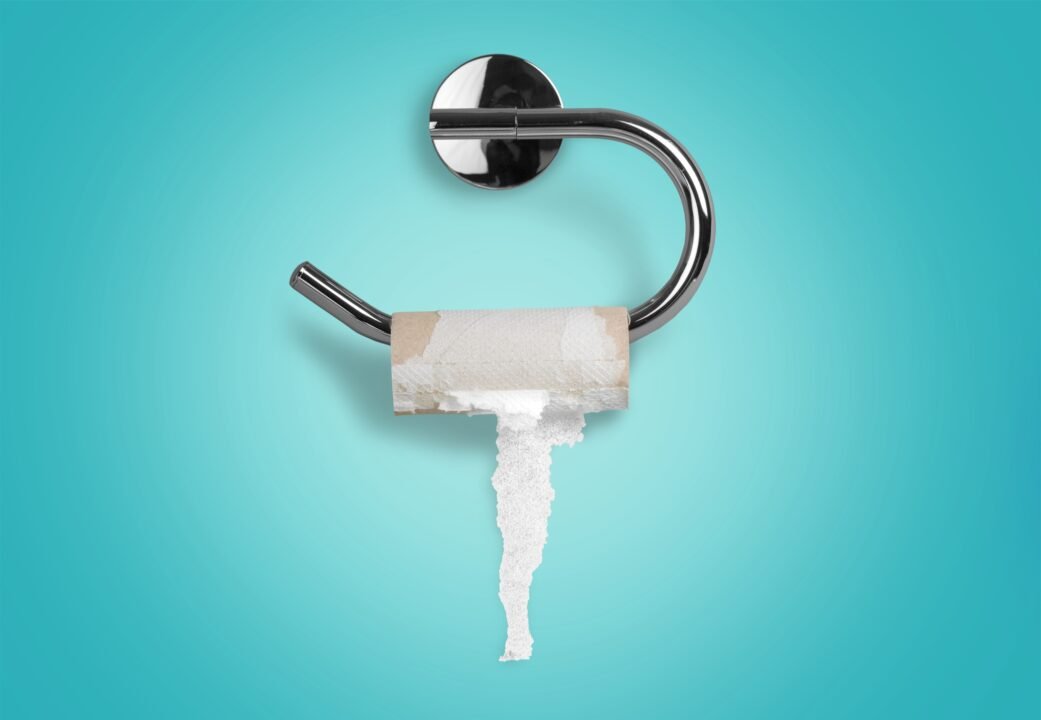Imagine entering a friend’s home and heading to the bathroom, only to find the toilet paper hanging in a manner opposite to your preference. Imagine it’s Martha, your meticulously organized friend, who probably color-codes her spice rack.
Suddenly, you find the roll hanging “under” like some sort of barbaric ritual.
Does this make you shrug indifferently, or does it spark a silent but intense internal debate about the state of your friendship?

History with a Wink
Toilet paper, a household staple, has evolved significantly since its inception.
Initially available in the 14th century for the Chinese imperial family (imagine their royal robes snagging on a rough roll!), it became commercially available in the US in 1857.
The “over” versus “under” debate likely started soon after the perforated roll’s invention in 1891…and toilet paper feuds began.
The patent for the first toilet paper roll, interestingly, depicted the paper going over the roll. Take this as a historical decree, “under” rebels!
Psychology Corner (with Exaggeration)
The “Over” Orientation: Individuals who prefer the toilet paper hanging over the roll tend to be described as more dominant, outgoing… some would even say megalomaniacal, with dreams of controlling all fluffy objects.
They may display qualities of assertiveness and are often considered more open to new experiences (as long as they’re the ones in charge of said experiences).
The “Under” Orientation: In contrast, those who choose the “under” method are often… well, let’s be honest, a little bit scared of the world. They cling to the safety of the wall, seeking stability in a chaotic universe.
This orientation is sometimes associated with a personality that prioritizes caution, hoarding tendencies, and a deep suspicion of change.
A Touch of Sarcasm
Studies, including one particularly nosy one by Dr. Gilda Carle, suggest these orientations can indeed reflect deeper personality traits.
Carle found that “over” individuals tend to be more assertive, while “under” individuals might be more…let’s say, prone to crafting bunker plans out of spare TP rolls.
Of course, personality is multifaceted and influenced by myriad factors, like whether or not you had your favorite cereal for breakfast.
Cultural Reflections (with a side of satire)
The way toilet paper is hung can also mirror cultural practices and norms.
For instance, in some cultures, the “over” method might predominate, reflecting a societal obsession with order and perfectly cascading linens. Whereas the “under” orientation in others might highlight a rebellious spirit, a disregard for rules, and possible tax evasion issues.
These preferences, while seemingly about convenience or aesthetics, can subtly indicate how cultures prioritize different values, from strict conformity to the passionate defense of individualism, even when it makes zero practical sense.
Toilet Paper Wars: The Battle for Bathroom Supremacy
Moreover, discussions around toilet paper orientation have transcended mere household preference to become symbols of broader cultural identity debates.
The “over” versus “under” debate can sometimes be a thinly veiled argument about how societies handle change, innovation, and adherence to tradition.
It’s a microcosm of larger discussions about whether to uphold the status quo or embrace new ways of thinking and doing, even if that “new way” is just flipping the darn roll.
Interpersonal Dynamics (where things get messy)
Beyond individual psychology and cultural reflections, the orientation of toilet paper can be a powder keg in relationships and household dynamics.
Couples and roommates often find themselves locked in light-hearted (or brutally passive-aggressive) debates over the correct way to hang the roll. This preference can spark discussions about compromise, respect for the other’s choices (however misguided they might be), and the ability to adapt to shared living spaces.
But let’s be real, toilet paper wars can get ugly.
Anecdotal evidence suggests that something as simple as toilet paper orientation can be the first crack exposing deep relationship fault lines.
For instance, a partner who secretly changes the roll in the dead of night isn’t just stubborn; they’re a bathroom anarchist, disrespecting your carefully crafted sense of order. Conversely, refusing to budge on this issue isn’t a sign of character, it’s emotional dictatorship.
Are you sure you want to share a life (and a bathroom) with someone this unreasonable?
Relationship counselors (who probably have strong opinions on this issue themselves) warn that the “over/under” conflict can escalate into epic battles.
Imagine passive-aggressive notes left on the mirror, retaliatory actions involving toothpaste tube squeezing, and cold wars lasting longer than the lifespan of a particularly fluffy roll.
Is the way someone hangs toilet paper really worth destroying a relationship over? Maybe, but only if they leave those single-ply rolls lying around… true monsters!
Broader Implications
What, then, can we glean from our toilet paper orientation about our approach to life and decision-making?
First, it highlights the importance of seemingly inconsequential habits in painting a broader picture of our personality and character. Our preferences, even in the most mundane matters, can signal deeper values like a thirst for control, adaptability, or a fear of cats batting the roll onto the floor.
Moreover, the “over” versus “under” debate encourages us to reflect on the nature of preferences themselves. It suggests that even in the smallest decisions, there’s room for self-expression, individuality, and the assertion of one’s character (even if that character is a tad neurotic about bathroom decor).
It also raises questions about the balance between personal preferences and communal living, pushing us to consider how we negotiate our sometimes-absurd desires in the context of shared spaces and relationships.

Takeaway
In exploring the orientation of toilet paper, we uncover not just a quirky preference but a window into human psychology, cultural values, and interpersonal dynamics.
This seemingly trivial choice serves as a reminder that our smallest habits can have broader implications for our personality, character, and interactions with others. As we reflect on our own toilet paper preferences, we might consider what other mundane choices reveal about us and how we navigate the world.
Whether “over” or “under”, the way we hang our toilet paper is more than a practical decision—it’s a gesture laden with meaning, a small but telling (and often hilarious) expression of who we are.
…So the next time you encounter a rogue roll, take a moment, consider the deeper implications, and maybe, just maybe, give the roll a flip for the sake of world peace.
